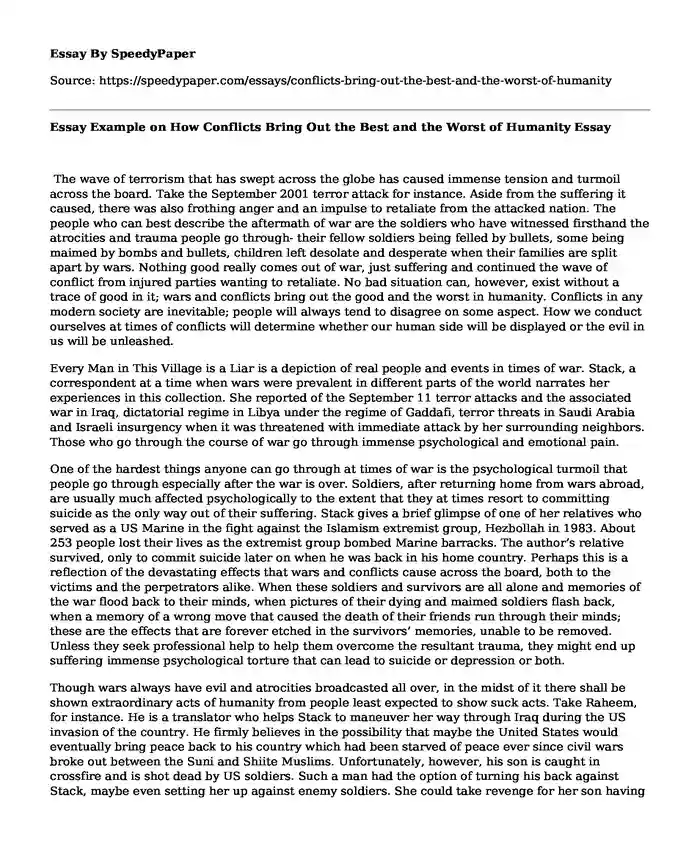The wave of terrorism that has swept across the globe has caused immense tension and turmoil across the board. Take the September 2001 terror attack for instance. Aside from the suffering it caused, there was also frothing anger and an impulse to retaliate from the attacked nation. The people who can best describe the aftermath of war are the soldiers who have witnessed firsthand the atrocities and trauma people go through- their fellow soldiers being felled by bullets, some being maimed by bombs and bullets, children left desolate and desperate when their families are split apart by wars. Nothing good really comes out of war, just suffering and continued the wave of conflict from injured parties wanting to retaliate. No bad situation can, however, exist without a trace of good in it; wars and conflicts bring out the good and the worst in humanity. Conflicts in any modern society are inevitable; people will always tend to disagree on some aspect. How we conduct ourselves at times of conflicts will determine whether our human side will be displayed or the evil in us will be unleashed.
Every Man in This Village is a Liar is a depiction of real people and events in times of war. Stack, a correspondent at a time when wars were prevalent in different parts of the world narrates her experiences in this collection. She reported of the September 11 terror attacks and the associated war in Iraq, dictatorial regime in Libya under the regime of Gaddafi, terror threats in Saudi Arabia and Israeli insurgency when it was threatened with immediate attack by her surrounding neighbors. Those who go through the course of war go through immense psychological and emotional pain.
One of the hardest things anyone can go through at times of war is the psychological turmoil that people go through especially after the war is over. Soldiers, after returning home from wars abroad, are usually much affected psychologically to the extent that they at times resort to committing suicide as the only way out of their suffering. Stack gives a brief glimpse of one of her relatives who served as a US Marine in the fight against the Islamism extremist group, Hezbollah in 1983. About 253 people lost their lives as the extremist group bombed Marine barracks. The author’s relative survived, only to commit suicide later on when he was back in his home country. Perhaps this is a reflection of the devastating effects that wars and conflicts cause across the board, both to the victims and the perpetrators alike. When these soldiers and survivors are all alone and memories of the war flood back to their minds, when pictures of their dying and maimed soldiers flash back, when a memory of a wrong move that caused the death of their friends run through their minds; these are the effects that are forever etched in the survivors’ memories, unable to be removed. Unless they seek professional help to help them overcome the resultant trauma, they might end up suffering immense psychological torture that can lead to suicide or depression or both.
Though wars always have evil and atrocities broadcasted all over, in the midst of it there shall be shown extraordinary acts of humanity from people least expected to show suck acts. Take Raheem, for instance. He is a translator who helps Stack to maneuver her way through Iraq during the US invasion of the country. He firmly believes in the possibility that maybe the United States would eventually bring peace back to his country which had been starved of peace ever since civil wars broke out between the Suni and Shiite Muslims. Unfortunately, however, his son is caught in crossfire and is shot dead by US soldiers. Such a man had the option of turning his back against Stack, maybe even setting her up against enemy soldiers. She could take revenge for her son having been felled by US bullets. He could allow bitterness have the best of him and join the other side of the war and fight against the US army. But he did not, he instead opted to keep doing her work, because he still believed in the possibility that his country, Iraq would be somehow one day feel the beauty of peace and never again worry about the sound of gunshots and death and destruction. His resolve to keep working with Stack, an American citizen whose soldiers had killed his son demonstrated great discipline even when he had the option of defecting and feeding information to the other side of the enemy camp. But perhaps he understood that war can only beget more blood spilling and suffering, and the best way out of it was to hope that peace would someday prevail.
Conflicts, if not handled in a sober manner, can easily escalate into ugly wars that cause massive destruction and loss of lives. Wars can only lead to negative effects; nothing of much good can come out of it. Despite the ugliness of war, however, at times traces of humanity can be spotted in the mess, giving us hope that humanity is still not lost after all.
Cite this page
Essay Example on How Conflicts Bring Out the Best and the Worst of Humanity. (2017, Oct 10). Retrieved from https://speedypaper.net/essays/conflicts-bring-out-the-best-and-the-worst-of-humanity
Request Removal
If you are the original author of this essay and no longer wish to have it published on the SpeedyPaper website, please click below to request its removal:
- Essay Example: Positive Impact of Technology on Communication
- Free Essay on the Movie Fight Club Research
- Free Essay with a Systematic Review on the Use of Some Drugs in Clinical Pharmacology
- Free Paper: Case Studies in Intercultural Conflict and Conflict Management
- A Scientific Study of Elephants, Free Essay
- Why Black Lives Matter? - Argumentative Essay Sample
- Free Essay Sample: Racial Transition
Popular categories





